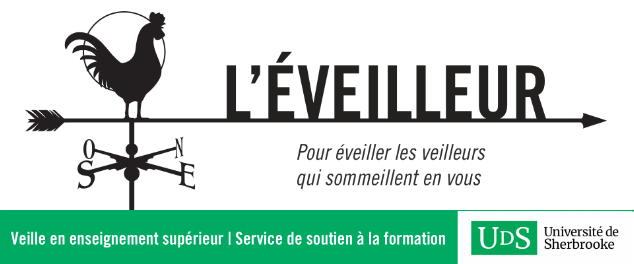Par le biais du site de danah boyd, je suis tombé sur DMLCentral.net, le nouveau site (il date d’octobre 2009) du Digital Media and Learning Research Hub à l’Université de Californie. Les chercheurs se présentent ainsi: « We think digital media practices are fundamentally reshaping society in far-reaching ways, especially in how people all around the world are learning and connecting with one another. » Le site compte notamment une section de « Ressources » produites par le groupe de recherche et une bibliographie fort intéressante qui compte 108 titres pour le moment. Plusieurs des auteurs qui contribuent au blogue du site m’étaient déjà connus: danah boyd, bien sûr, Henry Jenkins et Howard Rheingold, mais d’autres collaborateurs semblent tout aussi compétents.
En traversant le site, j’ai découvert notamment « The Social Media Classroom », un billet assez riche de Rheingold [que je vous invite à lire au complet, notamment pour ses liens vers d’autres textes]. Quelques perles:
« Five years ago, when I began to teach at Stanford and UC Berkeley, two places where I had expected web-based media to have permeated the classrooms, I was surprised to see blank looks on so many faces when I announced that students should start their personal blogging and wiki collaborations. […] So I put together an online survey and discovered a wide disparity in my students’ web skills [mon emphase]. Just because they Facebook, text, or participate in online games doesn’t mean that all young people understand rhetorics of blogging or collaborative uses of wikis or building personal learning networks with Twitter.»
« I had also assumed that more than a few teachers were using web media as an integral part of their curriculum. Again, I was puzzled to find so few of my peers using social media. So I asked an expert on technological innovation and learning why these educational pillars of Silicon Valley were not also hotbeds of online pedagogical experimentation. He replied: “The slow pace of adoption is easy to explain. This is a knowledge factory. People are hired here to create knowledge about medicine or computer science or economics or philosophy. If their contract requires them to teach and they never show up for class, that would be a problem. But there are no institutional incentives for innovating in pedagogy.” [mon emphase] That answer also helped explain why so many of the innovating educators I did discover were not at big name universities, but at community colleges, high schools, even elementary schools. »
« At the end of the term, when I talked with the students about how to improve the course, a substantial number complained that I not only subjected them to new ways of learning [mon emphase] (for one thing, they were accustomed to performing for the teacher rather than subjecting their work to the scrutiny of peers), and new media practices… »
« …The way I teach was not all that changed – much of the pedagogy that emerged involved letting go of “teaching” and learning to be the “chief learner” of a collaborative learning community [mon emphase]. I’m still in the early stages of learning, but according to my own feelings and the students’ evaluations, it seems to be working. »
Autre texte d’intérêt, « Educating for the Future, Not the Past » de Cathy Davidson qui pose clairement une question qui m’embête depuis un certain temps:
« Is extreme field specialization, so crucial for a segregated and hierarchical workforce, the right way to train kids for a future that might include three to seven career changes? »
Ressource intéressante donc. À exploiter.







Tant et aussi longtemps que l’on ne voudra pas reconnaître l’innovation pédagogique à un niveau comparable à la recherche, il sera bien difficile de faire changer des pratiques qui sont perçues comme étant davantage payantes pour l’institution… et pourtant, si l’on retirait soudainement la contribution financière du MELS en EEETP, le système entier tomberait sous son propre poids. Plutôt désolant.